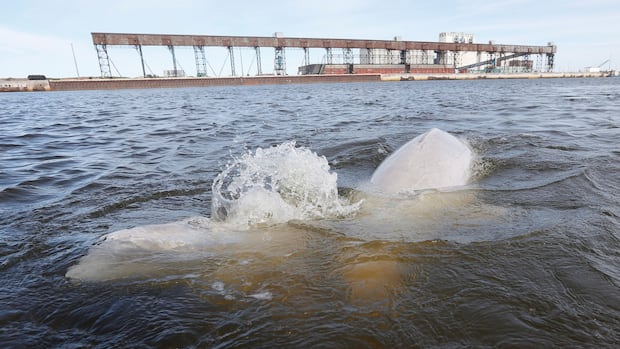Proposals to expand the Port of Churchill in northern Manitoba could bring an increase in shipping traffic and commercial activity — and some experts suggest that could affect the behaviour of the whales that are not only a major draw in the area’s nearly $100-million tourism industry, but an important food source for some in the North.Johnny Mamgark remembers first hunting beluga whales along the Hudson Bay coastline with his father as early as 13 or 14 years old. “It’s part of our culture; we live on it,” said Mamgark.”Living up north is so expensive, the food we buy is so expensive — that’s why we need to hunt to survive up north.”Mamgark, who now lives in Winnipeg, is Inuk and grew up in Arviat, Nunavut — a small Inuit community along the western coast of Hudson Bay, about 260 kilometres as the crow flies north of Churchill.He’s worried more shipping and marine traffic around the Port of Churchill would disrupt the beluga whale population in the area where his family and ancestors have hunted them for centuries. Johnny Mamgark, originally from Arviat, Nunavut, is seen outside his home in Winnipeg, where he now lives. Hunting beluga whales is ‘part of our culture’ in the North, he says. (Jaison Empson/CBC)”We want people to understand that we don’t just kill animals, we’re feeding ourselves and putting food on our table,” said Mamgark.Manitoba Premier Wab Kinew has promoted the idea of a new or expanded port along the province’s coastline as part of a major northern trade corridor that could ship commodities like oil, liquefied natural gas or hydrogen to European markets. The Port of Churchill, which is one of Canada’s northernmost deepwater ports and has a brief operational window each summer, is owned and operated by Arctic Gateway Group, a partnership of dozens of First Nations and Hudson Bay communities. It’s the only deepwater port with Arctic Ocean access in North America that’s also accessible by rail.Plans for a port expansion didn’t make the cut in Prime Minister Mark Carney’s first round of five major “nation-building” infrastructure projects, but upgrades are expected to be considered for the next wave.Until then, some community leaders are trying to figure out how the Arctic wildlife population could coexist with a major increase in marine traffic and commercial activity.Whales depend on soundThe beluga population in the western Hudson Bay is estimated at 55,000, with thousands congregating in the Nelson, Churchill, and Seal River estuaries during the summer months, according to the conservation group Oceans North. They’re known to mingle with paddling tourists in the Churchill estuary — part of a tourism industry in Churchill that contributes an estimated $99 million to Manitoba’s GDP, according to Travel Manitoba.Roughly 30 per cent of those tourists are drawn to Churchill specifically for the belugas, says Brendan McEwan, president of the Churchill Chamber of Commerce.”The amount of times that a beluga whale will create excitement, but also make somebody laugh, is a really interesting thing about the species,” said McEwan.But the whales don’t take as kindly to noisy ships.Marianne Marcoux, a research scientist at Fisheries and Oceans Canada, says that noise presents problems for belugas, which depend on sound for basic functions like detecting their predator, killer whales.The low frequency sound from ships can travel long distances, especially in quiet Arctic waters, making it very difficult for belugas to communicate with one another, said Marcoux.A beluga whale surfaces for air near the Port of Churchill earlier this month. Noise presents problems for the whales, which depend on sound for basic functions like detecting predators, says Marianne Marcoux, a research scientist at Fisheries and Oceans Canada. (Darren Bernhardt/CBC)”That sound can mask the vocalization of a whale and the sounds from other whales that you want to listen to,” said Marcoux. “It’s not just noise at the port — there’s going to be noise all around the shipping lane,” she said. “That’s concerning.”A 1999 study published in the academic journal Marine Mammal Science found that in the St. Lawrence river estuary, beluga whales decreased their calling rates as ships approached. Another study published in the Canadian Bulletin of Fisheries and Aquatic Sciences in the 1980s found beluga whales were “extraordinarily sensitive” to shipping activity in the High Arctic during the spring, producing “alarm calls” and rapid movements when ships were within a 40 to 55-kilometre radius. Stephen Petersen, the director of conservation and research at the Assiniboine Park Conservancy in Winnipeg, says he doesn’t know for sure what would happen if ship traffic increases, but his best guess is that the whales will leave the area if it becomes too noisy. (Tyson Koschik/CBC)”The Churchill estuary is quite short and quite narrow, so there you’re going to get lots of resonance and lots of noise,” said Stephen Petersen, the director of conservation and research at the Assiniboine Park Conservancy in Winnipeg.Estuaries offer a lot of benefits to beluga whales, Petersen said — the warmer water is more suitable for giving birth, there’s a large food source, and killer whales are less likely to follow them into shallower waters. While he doesn’t know for sure what would happen if ship traffic increases, his best guess is that the whales will leave the area if it becomes too noisy. This is one reason he and his colleagues started “Beluga Bits” — a citizen-based, non-invasive project that aims to monitor and track beluga whales around Churchill.The project could help encourage Churchill authorities to limit the impact of marine traffic on belugas during certain times of year, potentially opening a path to coexistence with increased shipping, said Petersen.Conversations are underway in Churchill around ‘how to embrace more economic opportunity, while safeguarding the region’s unique ecosystem,’ says Churchill Chamber of Commerce president Brendan McEwan. (Darren Bernhardt/CBC)The chamber’s McEwan said there are conversations happening right now in Churchill around “how to embrace more economic opportunity, while safeguarding the region’s unique ecosystem and Indigenous ways of life.””We want to welcome increased economic development, development that our economy needs,” he said.”But now is the time to ensure that we’re taking the necessary steps and working on a plan to ensure that all industries are viable going forward, and that our Indigenous cultures and our species and environment are taken care of.”Protected area proposalAnother proposal to protect the ecosystem along the western Hudson Bay coastline is by designating a national marine conservation area.Efforts to establish one of the federally designated protected areas in the region have been underway for over a decade, according to Christopher Debicki, vice-president of policy development with Oceans North. Christopher Debicki, vice-president of policy dDevelopment with Oceans North, says efforts are underway to protect the ecosystem along the western Hudson Bay coastline is by designating it a national marine conservation area. (Kevin Nepitabo/CBC)The main benefit of a marine conservation area is that it would provide a management framework for monitoring the health of the ecosystem, he said.”If done carefully, with good management and good monitoring,” the potential expansion of the Port of Churchill “shouldn’t have an adverse impact on the beluga population,” said Debicki.The next stage in getting an marine conservation area designation for the estuaries along the western Hudson Bay would be for Parks Canada to initiate a feasibility study. Mamgark, who has previously worked with Oceans North, acknowledges that having access to faster shipments through port expansion could benefit surrounding communities.However, he’s still worried about how it might affect his community’s traditional way of life. “This expansion, I think, is good for everyone,” he said.”It’s going to create a lot of jobs for the people of Churchill, but it’s also going to affect the people along the coast, the Inuit who depend on sea mammals for food.”That’s something we have to discuss between Manitoba and the Inuit.”
Thursday, 5 Feb 2026
Canada – The Illusion
Search
Have an existing account?
Sign In
© 2022 Foxiz News Network. Ruby Design Company. All Rights Reserved.
You May also Like
- More News:
- history
- Standing Bear Network
- John Gonzalez
- ᐊᔭᐦᑊ ayahp — It happened
- Creation
- Beneath the Water
- Olympic gold medal
- Jim Thorpe
- type O blood
- the bringer of life
- Raven
- Wás’agi
- NoiseCat
- 'Sugarcane'
- The rivers still sing
- ᑲᓂᐸᐏᐟ ᒪᐢᑿ
- ᐅᑳᐤ okâw — We remember
- ᐊᓂᓈᐯᐃᐧᐣ aninâpêwin — Truth
- This is what it means to be human.
- Nokoma











